Grace Mappes, Christina Harward, Angelica Evans, Kateryna Stepanenko, and Frederick W. Kagan
A prominent Russian milblogger and front-line unit commander claimed that Russian Airborne Forces (VDV) Commander Colonel General Mikhail Teplinsky “saved” the Russian 31st Guards VDV Brigade, which was fighting south of Bakhmut, mirroring claims made by a much smaller milblogger about VDV units in western Zaporizhia Oblast. Vostok Battalion commander Alexander Khodakovsky recalled a conversation with then-Commander of the 31st VDV Airborne Brigade Colonel Andrei Kondrashkin prior to Kondrashkin’s death around Bakhmut in mid-September, in which Kondrashkin revealed that his forces suffered personnel losses and that their motivation to fight dropped to a critical level.[1] Kondrashkin reportedly stated that the Russian military command demanded that his forces undertake “decisive actions,” while he knew that his personnel were suffering a critical lack of motivation. Khodakovsky noted that Kondrashkin refrained from raising his concerns to the military command and proceeded to blame his military failures on the lack of cohesion among Russian forces. Khodakovsky, in turn, noted that cohesion was not the problem, but rather that Kondrashkin needed to make a choice to either “waste” his troops in combat or protest the Russian military command’s order at the expense of his career. Khodakovsky observed that Kondrashkin never had a chance to make this choice because he sustained an injury in combat immediately after the conversation, and that Teplinsky “saved” the 31st VDV Brigade by taking the “remnants [of the brigade] under his wing” and giving them the opportunity to take a break from combat.
A Telegram channel that advocates for Teplinsky also amplified Khodakovsky’s account, claiming that Russian VDV forces – namely elements of the Russian 7th and 76th VDV divisions – are facing similar issues in western Zaporizhia Oblast.[2] The milblogger claimed that Teplinsky is no longer able to rescue these divisions, however, as he was quietly stripped of his responsibilities. ISW cannot confirm either Khodakovsky‘s or the pro-Teplinsky milblogger’s claims, but both narratives attempt to portray Teplinsky as a commander who values the wellbeing of his forces over his career – likely to advance political goals that could support changes in the Russian military command. Khodakovsky’s account of Kondrashkin’s dilemma prior to his death also supports ISW’s prior assessment that Ukrainian counteroffensive operations south of Bakhmut may be degrading Russian units defending and counterattacking the area.[3]
A Russian “Storm Z” assault unit instructor speculated that the Russian Ministry of Defense (MoD) removed Lieutenant General Andrey Sychevoy from commanding in the Bakhmut direction due to his poor performance. The instructor claimed on October 1 that the Russian military command removed Sychevoy from his position for conducting unprepared and unsupported counterattacks south of Bakhmut near Klishchiivka and Andriivka.[4] Sychevoy’s current formal position within the Russian military is unknown. Sychevoy previously commanded the Russian Western Group of Forces in Kharkiv Oblast until his dismissal in early September 2022, and this claim is the first observed speculation that Sychevoy has had a role in military operations in Ukraine since September 2022.[5] Prominent Russian ultranationalist media outlet Tsargrad claimed in August 2023 that Sychevoy refuses all journalistic requests for comment, indicating that Sychevoy retained an official position and may have intended to keep this position concealed.[6]
Ukrainian forces marginally advanced in the Donetsk-Zaporizhia Oblast border area amid continued counteroffensive operations in western Zaporizhia Oblast and near Bakhmut on October 2. Geolocated footage published on October 2 indicates that Ukrainian forces marginally advanced northwest of Novomayorske (18km southeast of Veylka Novosilka).[7] The Ukrainian General Staff reported that Ukrainian forces continued offensive operations in the Melitopol (western Zaporizhia Oblast) and Bakhmut directions.[8] ISW is updating its October 1 assessment that Ukrainian forces lost positions in a trench system southwest of Robotyne (13km south of Orikhiv) to Russian counterattacks between September 13 and 30.[9] Geolocated footage published on October 2 and satellite imagery indicate that Ukrainian forces likely retook these positions sometime between September 12 and 17 and currently hold them.[10]
Prominent actors in the Russian information space continue to speculate about the possible future of the Wagner Group under Rosgvardia. A Kremlin-affiliated milblogger claimed on October 2 that the Wagner Council of Commanders and Wagner Commander Anton Yelizarov (call sign “Lotos”) reached an agreement with Rosgvardia in which Wagner personnel must sign individual and group agreements to join Rosgvardia before January 1, 2024.[11] The milblogger claimed that the group agreements “serve as a guarantee that [Wagner] will not be ‘torn apart’” and that Wagner personnel will be able to keep their symbols and callsigns while serving under Rosgvardia. The milblogger claimed that although it is unclear where Rosgvardia will deploy its Wagner personnel in Ukraine, it will likely not be to the Bakhmut area where former Wagner personnel who signed contracts with the Russian MoD under former Wagner representative and current MoD employee Andrey Troshev are reportedly operating. The milblogger stated that the future of Wagner’s operations in Africa and the Middle East is also not clear as Rosgvardia has reportedly only approved Wagner’s use of aircraft for operations in the war in Ukraine and the new Wagner leader, Yevgeny Prigozhin’s son Pavel, is focusing only on Wagner’s business in Russia.[12] ISW continues to assess that the Kremlin’s ideas about the relationship(s) between Wagner elements and the Russian government are unclear at this time as Russian President Vladimir Putin publicly embraced Troshev and subordinated some Wagner elements to the Russian MoD on the one hand, while the Russian MoD will need to supply Rosgvardia with the equipment it lacks on the other.[13] Russian milbloggers’ continued discussion of the matter recently indicates that the relationship is likely still not fully defined or made public.
Interethnic tensions and claims about the superiority of Chechen “Akhmat” forces over regular Russian forces continue to generate controversy in the Russian information space. Chairman of the “Patriots of Russia” political party and the State Duma Committee on Nationalities Gennady Semigin reportedly published a since-deleted statement on the “Patriots of Russia” website in support of Chechen Republic Head Ramzan Kadyrov’s son on September 29 after Kadyrov’s son was filmed beating a detainee accused of burning a Quran.[14] The post stated that “if the Russian soldier defended his ideals as uncompromisingly, then the [Chechen] Akhmat battalion would not have to kick the soldiers of the Russian Armed Forces onto the battlefield.”[15] Semigin’s post generated widespread criticism within the Russian information space on October 2, with one Russian official going so far as to call for Russian authorities to ban Duma members from speaking publicly about the war in Ukraine.[16] One Russian milblogger accused Semigin of attempting to incite ethnic hatred by comparing ”brave Chechens with cowardly Russians.”[17] Semigin later issued a statement on Telegram claiming that unspecified actors hacked the ”Patriots of Russia” website to publish the statement in protest of a bill on interethnic relations that his team was developing.[18] A milblogger also criticized Semigin‘s claim of a hacker posting the message, asking why Semigin did not take down the statement sooner or how Semigin was able to access the “Patriots of Russia“ website if it had been hacked.[19] ISW has long observed tensions between Chechen and non-Chechen officials and military units, and the continued emotional reaction within the Russian information suggests that these tensions are still present.[20]
Russian forces conducted a small-scale Shahed-131/136 drone strike on Ukraine on the night of October 1-2 after Russian forces conducted a record number of drone strikes targeting Ukrainian grain and port infrastructure in September 2023. Ukrainian military officials reported that Russian forces launched seven drones from the Krasnodar Krai direction and that Ukrainian air defenses shot down four drones.[21] Ukrainian Air Force Spokesperson Colonel Yuriy Ihnat stated that even though Russian forces have launched fewer drones in the past days, the Russian strikes still target Ukrainian military and infrastructure areas and are reconnoitering Ukrainian air defenses.[22] Ukrainian military expert Aleksandr Kovalenko stated on October 1 that Russian forces launched a record number of 521 drones that mostly targeted Ukrainian port and grain infrastructure in September 2023.[23] Kovalenko stated that Russia is still dependent on Iran for drone production due to issues with domestic production and that this September increase was due to Iran’s possible increased production from 100 Shahed-136 drones per month at the end of 2022 to 150-200 per month by May 2023.
Key Takeaways:
- A prominent Russian milblogger and front-line unit commander claimed that Russian Airborne Forces (VDV) Commander Colonel General Mikhail Teplinsky “saved” the Russian 31st Guards VDV Brigade, which was fighting south of Bakhmut, mirroring claims made by a much smaller milblogger about VDV units in western Zaporizhia Oblast.
- A Russian “Storm Z” assault unit instructor speculated that the Russian Ministry of Defense (MoD) removed Lieutenant General Andrey Sychevoy from commanding the Bakhmut direction due to his poor performance.
- Ukrainian forces marginally advanced in the Donetsk-Zaporizhia Oblast border area amid continued counteroffensive operations in western Zaporizhia Oblast and near Bakhmut on October 2.
- Prominent actors in the Russian information space continue to speculate about the possible future of the Wagner Group under Rosgvardia.
- Interethnic tensions and claims about the superiority of Chechen “Akhmat” forces over regular Russian forces continue to generate controversy in the Russian information space.
- Russian forces conducted a small-scale Shahed-131/136 drone strike on Ukraine on the night of October 1-2 after Russian forces conducted a record number of drone strikes targeting Ukrainian grain and port infrastructure in September 2023.
- Russian forces conducted offensive operations near Kreminna, near Bakhmut, along the Avdiivka-Donetsk City line, in the western Donetsk-eastern Zaporizhia Oblast border area, and in western Zaporizhia Oblast and reportedly advanced in some areas on October 2.
- The Russian “Vostok” Battalion continued to complain on October 1 that the Russian military command is not fulfilling its promises of having the unit fight as a second-echelon force and is not providing state awards.
- Russian occupation officials continued to transport Ukrainian children to Russia under the guise of educational trips.
We do not report in detail on Russian war crimes because these activities are well-covered in Western media and do not directly affect the military operations we are assessing and forecasting. We will continue to evaluate and report on the effects of these criminal activities on the Ukrainian military and the Ukrainian population and specifically on combat in Ukrainian urban areas. We utterly condemn these Russian violations of the laws of armed conflict, Geneva Conventions, and humanity even though we do not describe them in these reports.
- Russian Main Effort – Eastern Ukraine (comprised of two subordinate main efforts)
- Russian Subordinate Main Effort #1 – Capture the remainder of Luhansk Oblast and push westward into eastern Kharkiv Oblast and encircle northern Donetsk Oblast
- Russian Subordinate Main Effort #2 – Capture the entirety of Donetsk Oblast
- Russian Supporting Effort – Southern Axis
- Russian Mobilization and Force Generation Efforts
- Activities in Russian-occupied areas
Russian Main Effort – Eastern Ukraine
Russian Subordinate Main Effort #1 – Luhansk Oblast (Russian objective: Capture the remainder of Luhansk Oblast and push westward into eastern Kharkiv Oblast and northern Donetsk Oblast)
Russian sources conducted unsuccessful ground attacks near Kreminna on October 2. The Ukrainian General Staff reported on October 2 that Russian forces conducted an unsuccessful attack near Makiivka (22km northwest of Kreminna).[24] Ukrainian Eastern Grouping of Forces Spokesperson Captain Ilya Yevlash stated on October 2 that elements of the Russian 25th Combined Arms Army (CAA) replaced elements of the Russian 41st CAA (Central Military District) and the 76th Air Assault (VDV) Division, which previously took heavy losses while operating near Kreminna.[25] Yelash stated that elements of the Russian 25th CAA have taken up defensive positions in the area but that Russian forces are not using these elements at a “high intensity.”[26] A Russian milblogger claimed that the Russian 21st Motorized Rifle Brigade (2nd Combined Arms Army, Central Military District) is operating in the Svatove-Kreminna area.[27]
Russian sources claimed that Ukrainian forces conducted unsuccessful ground attacks near Kreminna on October 2. The Russian MoD claimed that Russian forces repelled two Ukrainian attacks near Dibrova (7km southwest of Kreminna) and Bilohorivka (10km south of Kreminna) in Luhansk Oblast.[28] A Russian milblogger claimed on October 1 that Ukrainian forces unsuccessfully attacked near Torske (12km west of Kreminna) and the Serebryanske forest area.[29]
Russian Subordinate Main Effort #2 – Donetsk Oblast (Russian objective: Capture the entirety of Donetsk Oblast, the claimed territory of Russia’s proxies in Donbas)
Ukrainian forces continued offensive operations in the Bakhmut area but did not make any confirmed gains on October 2. Ukrainian Eastern Group of Forces Spokesperson Captain Ilya Yevlash stated that heavy fighting continues south of Bakhmut near the railway line, along which runs the current Russian line of defense.[30] Yevlash stated that Russian forces aim to hold the defensive line along the railway south of Bakhmut at any cost. A Russian milblogger claimed that Ukrainian forces continued attempts to advance east of the railway line near Andriivka (10km southwest of Bakhmut) and that Ukrainian forces hold unspecified ”more advantageous” positions in the area.[31] A Russian source claimed that a Chechen “Akhmat” special forces detachment and the 4th Motorized Rifle Brigade’s 1st Battalion (2nd Luhansk People’s Republic [LNR] Army Corps) repelled a Ukrainian attack near Klishchiivka (7km southwest of Bakhmut).[32] The Russian MoD claimed that Russian forces repelled Ukrainian attacks near Andriivka.[33]
Russian forces continued counterattacks in the Bakhmut area but did not advance on October 2. The Ukrainian General Staff reported that Russian forces unsuccessfully tried to recapture lost positions near Andriivka.[34] A Russian milblogger claimed that Russian forces counterattacked near Klishchiivka.[35]
Russian forces continued offensive operations on the Avdiivka-Donetsk City line on October 2 and reportedly advanced recently. Russian milbloggers claimed that Russian forces captured several Ukrainian positions near Sieverne (6km west of Avdiivka), Keramik (14km northwest of Avdiivka) and Stepove (8km northwest of Avdiivka) on October 1 and 2.[36] The Ukrainian General Staff reported that Ukrainian forces repelled Russian attacks east of Stepove and near Avdiivka, Keramik, Pervomaiske (11km southwest of Avdiivka), Marinka (on the western outskirts of Donetsk City), and Novomykhailivka (36km southwest of Avdiivka).[37]
Ukrainian forces reportedly counterattacked on the Avdiivka-Donetsk City line on October 2 but did not advance. The Russian MoD claimed that Russian forces repelled Ukrainian attacks near Nevelske and Krasnohorivka (both immediately west of Donetsk City).[38] A Russian milblogger claimed that Ukrainian forces counterattacked against Russian forces towards Vodyane (7km southwest of Avdiivka), Opytne (3km southwest of Avdiivka), Krasnohorivka, and Novokalynove (11km northwest of Avdiivka).[39]
Russian Supporting Effort – Southern Axis (Russian objective: Maintain frontline positions and secure rear areas against Ukrainian strikes)
Ukrainian forces conducted offensive operations in the western Donetsk-eastern Zaporizhia Oblast border area and marginally advanced on October 2. Geolocated footage published on October 2 indicates that Ukrainian forces marginally advanced northwest of Novomayorske (18km southeast of Veylka Novosilka).[40] The Russian MoD claimed that Ukrainian forces unsuccessfully attacked near Pryyutne (16km southwest of Velyka Novosilka).[41]
Russian forces conducted offensive actions in the western Donetsk-eastern Zaporizhia Oblast border area but did not make any confirmed gains on October 2. A Russian milblogger claimed that there are unconfirmed reports that Russian forces advanced 100-150 meters east of Urozhaine (9km south of Velyka Novosilka) where elements of the Russian 36th Combined Arms Army (Eastern Military District) are operating.[42] The Ukrainian General Staff reported that Russian forces unsuccessfully attacked near Staromayorske (9km south of Velyka Novosilka), Rivnopil (10km southwest of Velyka Novosilka), and Novodarivka (15km southwest of Velyka Novosilka).[43] Another Russian milblogger claimed that Russian forces attacked from Pryyutne but did not specify an outcome.[44]
Russian sources claimed that Ukrainian forces conducted offensive operations in western Zaporizhia Oblast but did not advance on October 2. Russian milbloggers claimed that Ukrainian forces unsuccessfully attacked near Novoprokopivka (13km south of Orikhiv) and Robotyne.[45] A Russian source claimed that Ukrainian forces are conducting daily offensive operations northeast of Robotyne.[46]
ISW assessed on October 1 that Ukrainian forces lost positions southwest of Robotyne to Russian counterattacks between September 13 and 30.[47] ISW is updating our assessment, however, based on new footage published on October 2 and satellite imagery, which indicates that Ukrainian forces still hold these positions and have held them since sometime between September 12 and 17.[48]
Russian forces conducted offensive operations in western Zaporizhia Oblast but did not advance on October 2. The Ukrainian General Staff reported that Russian forces unsuccessfully attacked west of Verbove (18km southeast of Orikhiv).[49] Russian milbloggers also claimed that Russian forces unsuccessfully attacked near Verbove.[50]
A Ukrainian official stated that Russian forces are increasingly using aircraft to strike Kherson Oblast at night rather than during the day. Ukrainian Southern Operational Command Spokesperson Captain First Rank Nataliya Humenyuk stated that Russian forces only launched two KAB-500 aerial bombs at Kherson Oblast on during the day October 1 but launched 18 KAB-500 bombs that night on October 1-2.[51] Humenyuk reported that the Russian strike damaged a hospital and critical infrastructure.
Russian Mobilization and Force Generation Efforts (Russian objective: Expand combat power without conducting general mobilization)
The Russian “Vostok” Battalion continued to complain on October 1 that the Russian military command is not fulfilling its promise of using the unit as a second-echelon force in combat and is not providing state awards.[52] The “Vostok” Battalion claimed that since the start of the full-scale invasion, its personnel have been fighting on the frontlines instead of performing “clearing” functions after assaults.[53] The “Vostok” Battalion claimed that 31 of its personnel died in combat and 151 were wounded over the past 19 months of combat and complained that Russian military command is not sufficiently awarding the battalion for its sacrifices as part of the Russian Operational-Combat Tactical Formation “Kaskad.”
A Russian milblogger observed that Russian forces are using outdated S-60 automatic anti-aircraft guns from the 1950s in the Kupyansk direction.[54] The milblogger stated that many social media users questioned the Russian MoD footage that showed Russian forces using an S-60 gun and asked about the age of these systems. The milblogger noted that while he does not doubt the effectiveness of Soviet armaments, he hopes that Russian forces will equip frontline units with new and modern equipment.
Former Wagner Group servicemen who have returned from Ukraine continue to commit crimes in Russia. A Wagner serviceman from Lipetsk Oblast reportedly killed his four-year-old stepdaughter and beat his wife months after returning from combat.[55] A pardoned convict who had served in Wagner reportedly escaped a detention center in Krasnodar Krai when serving a 10-day sentence for minor hooliganism charges.[56]
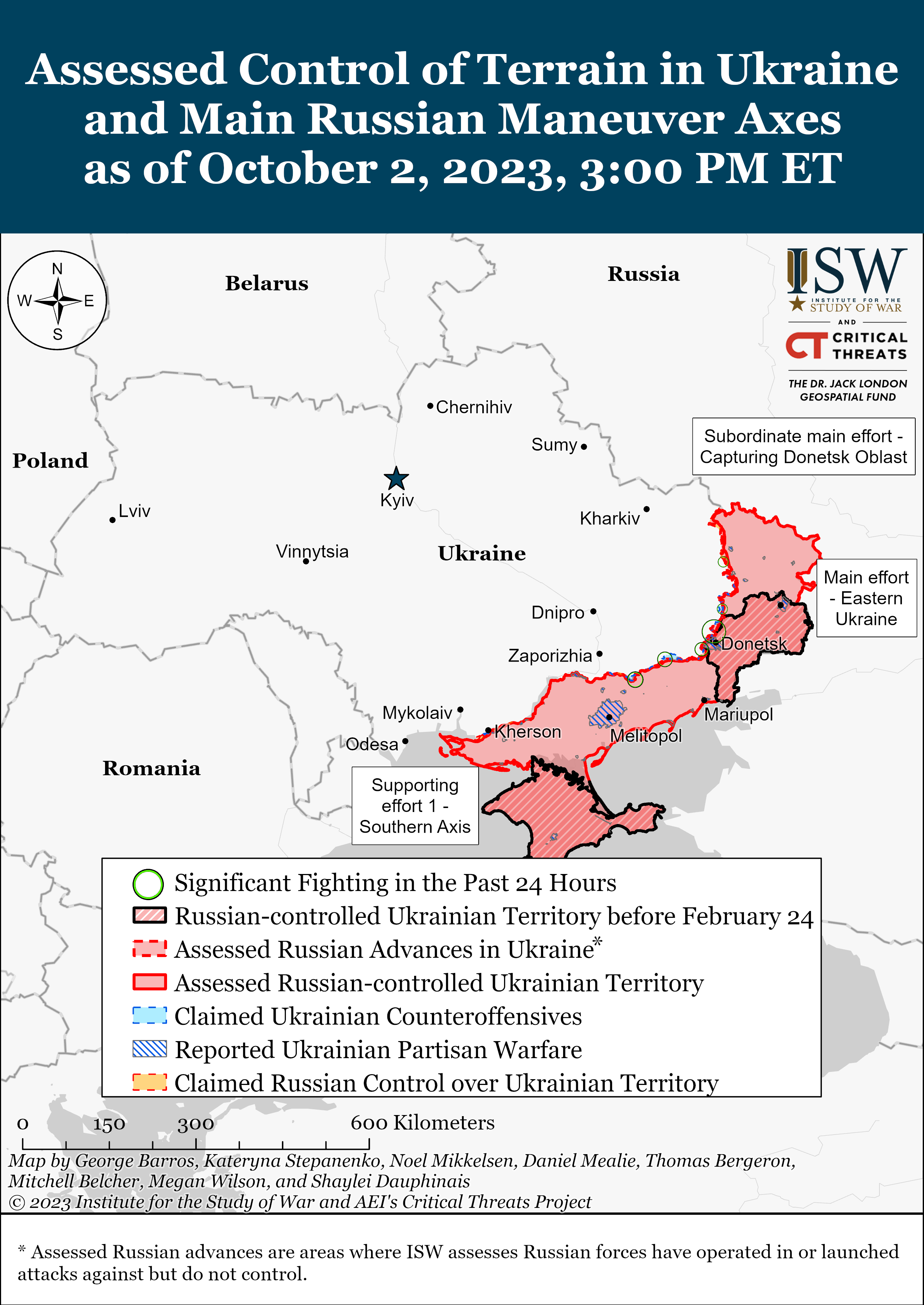
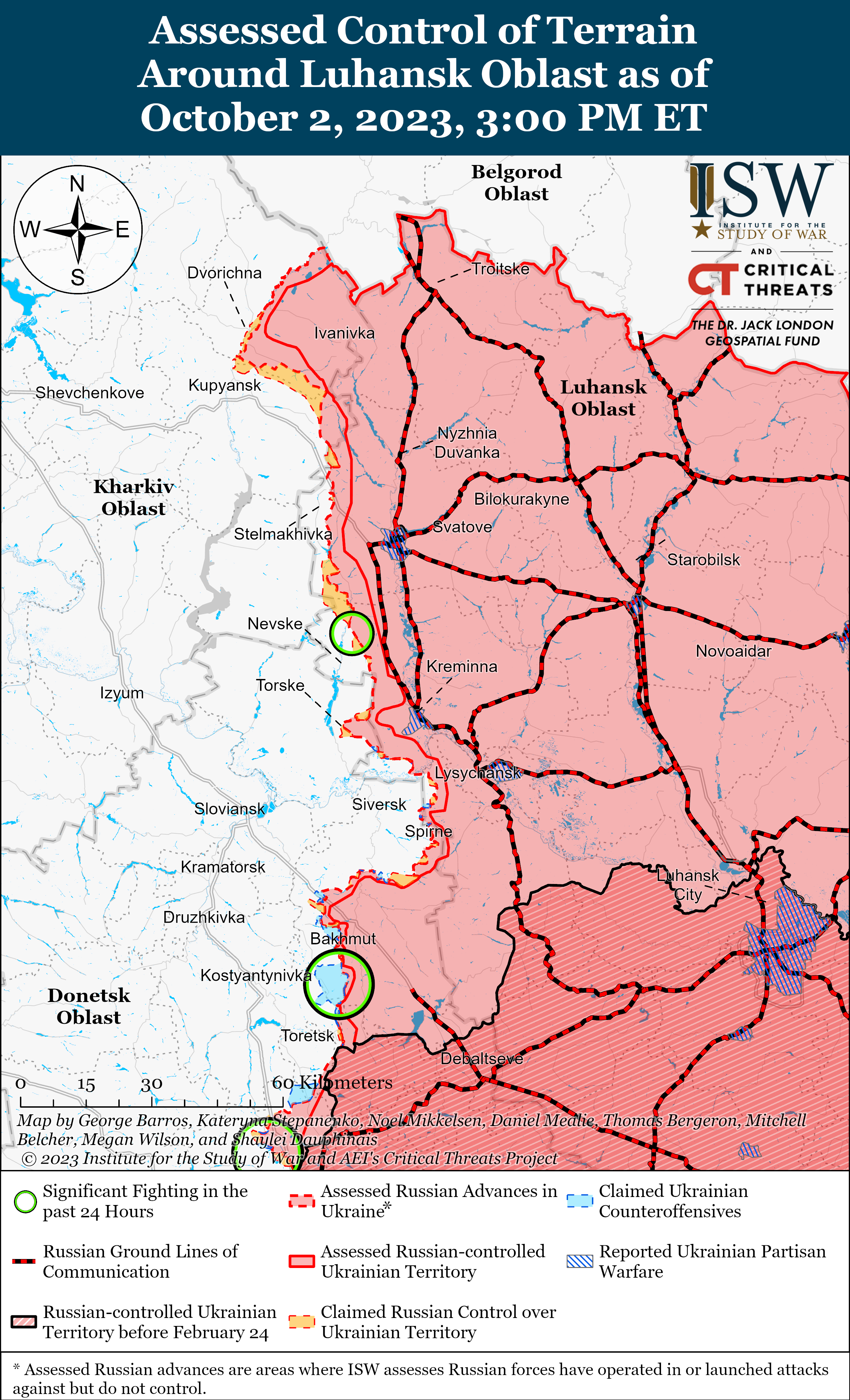
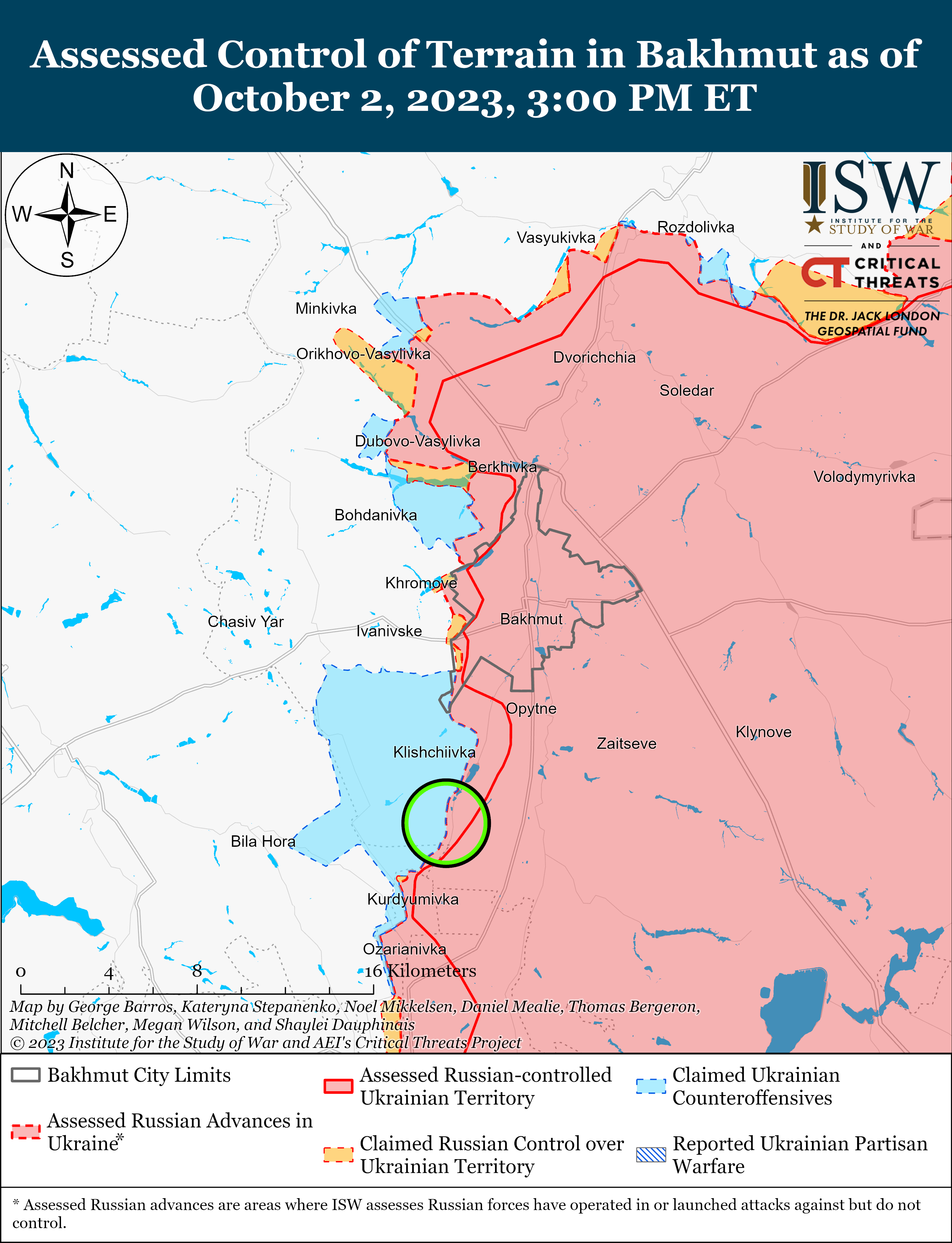
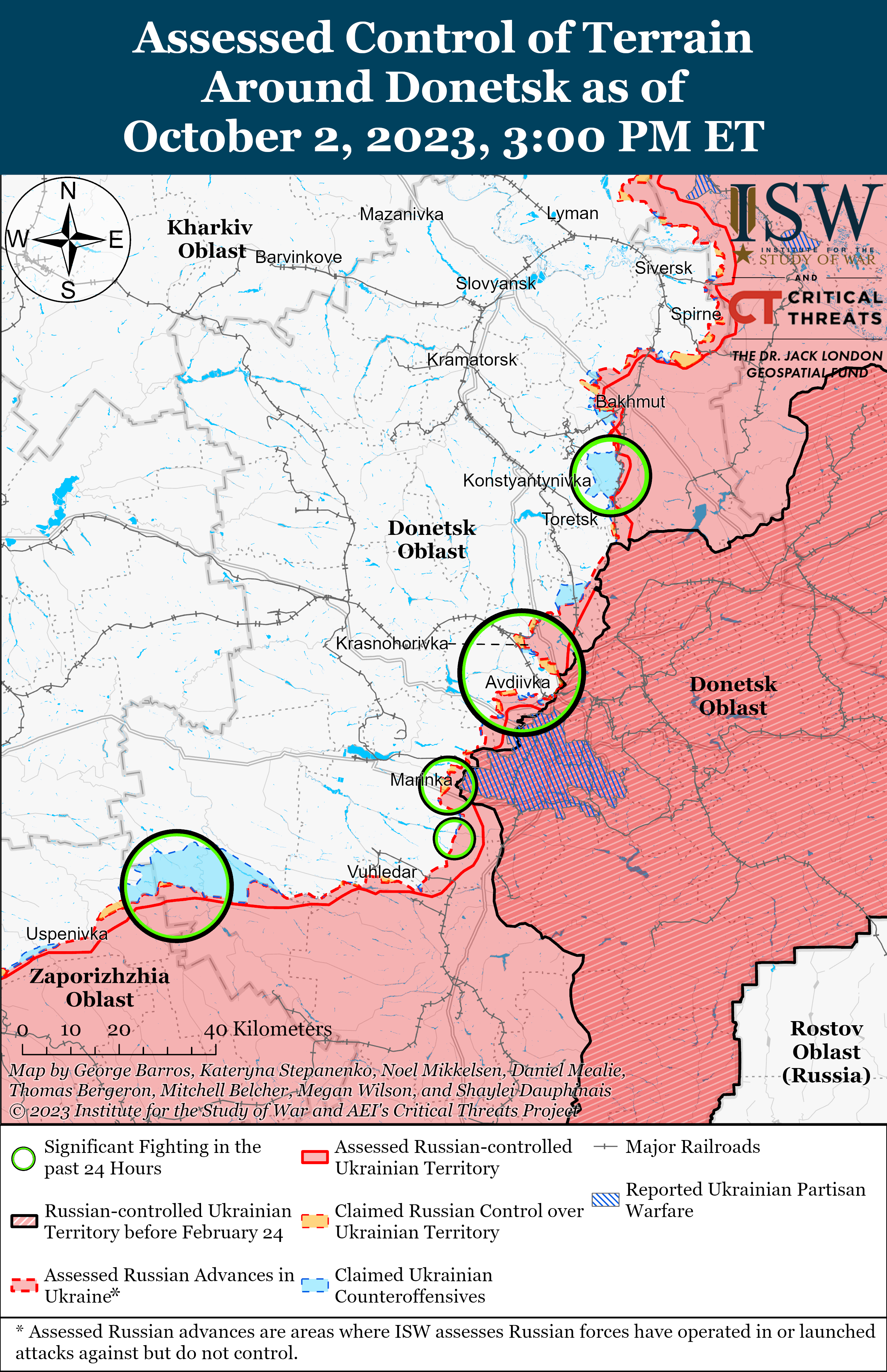
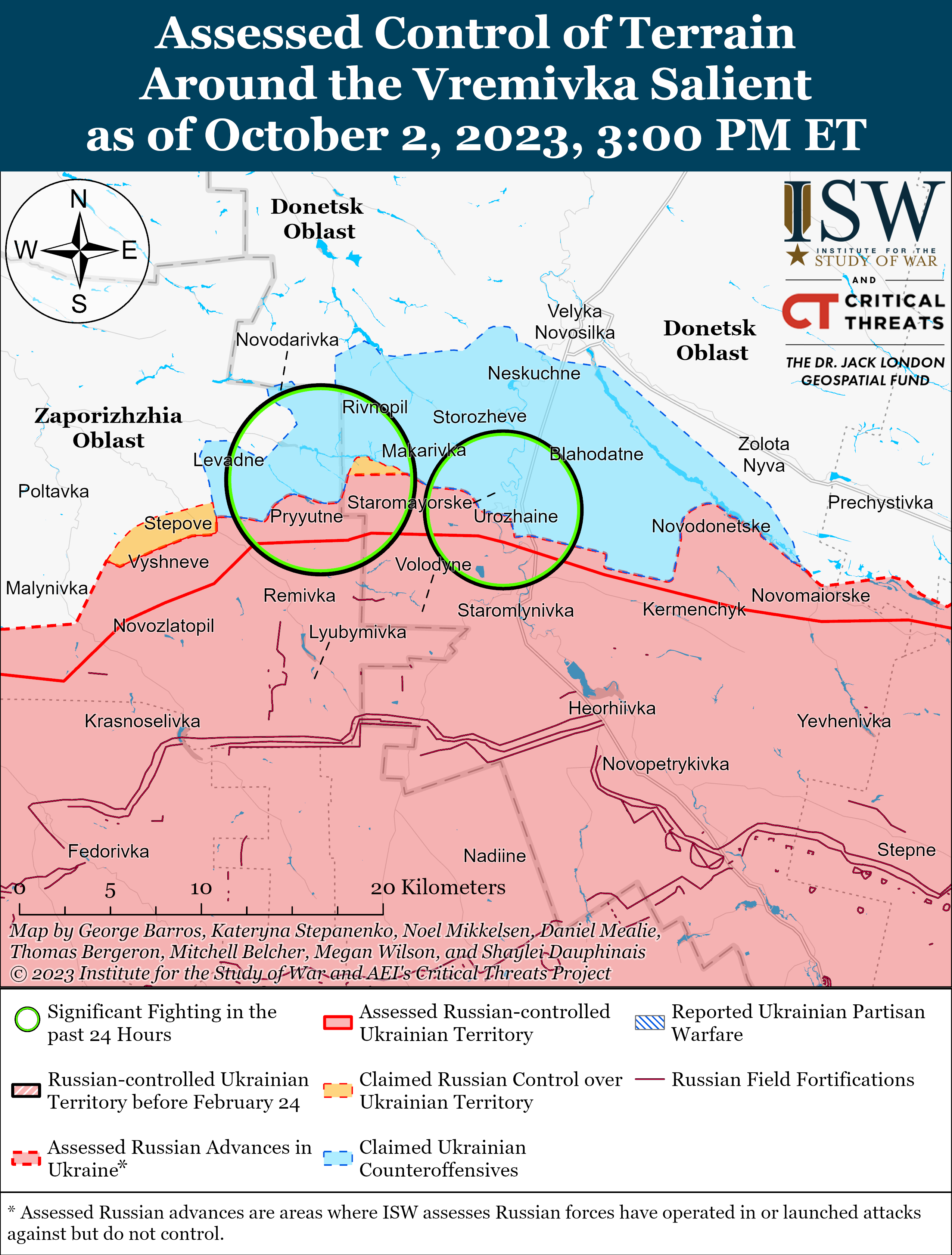
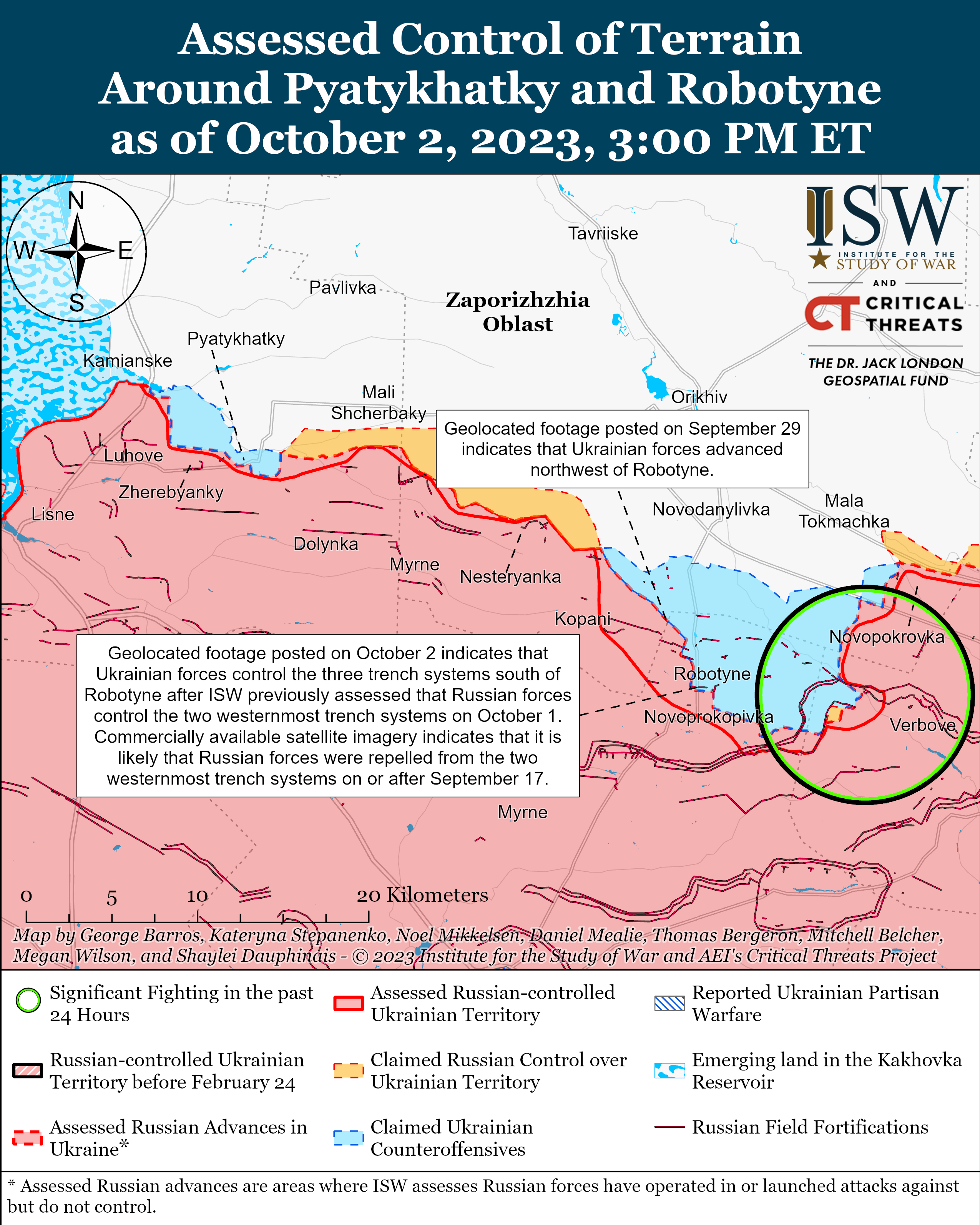
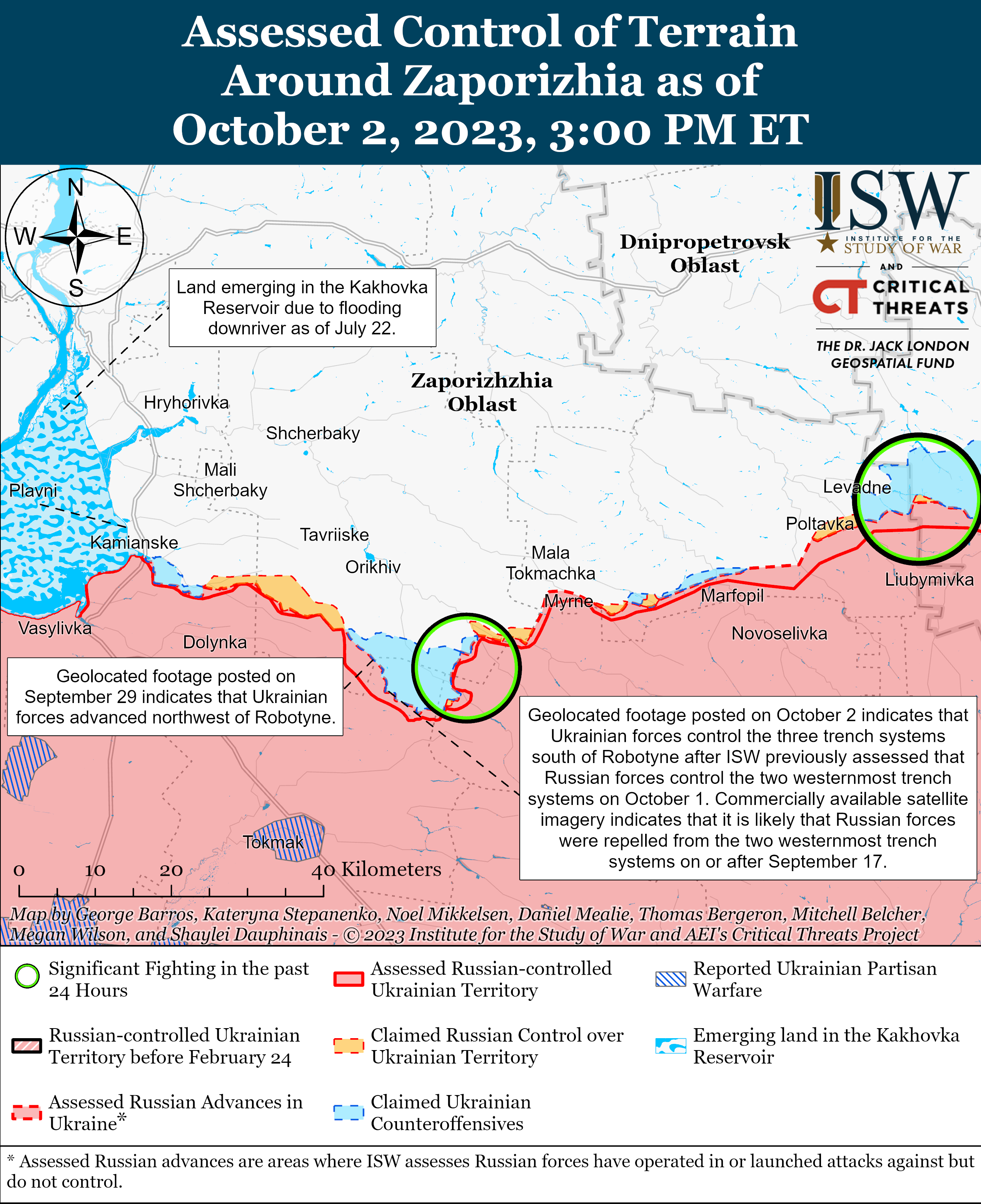
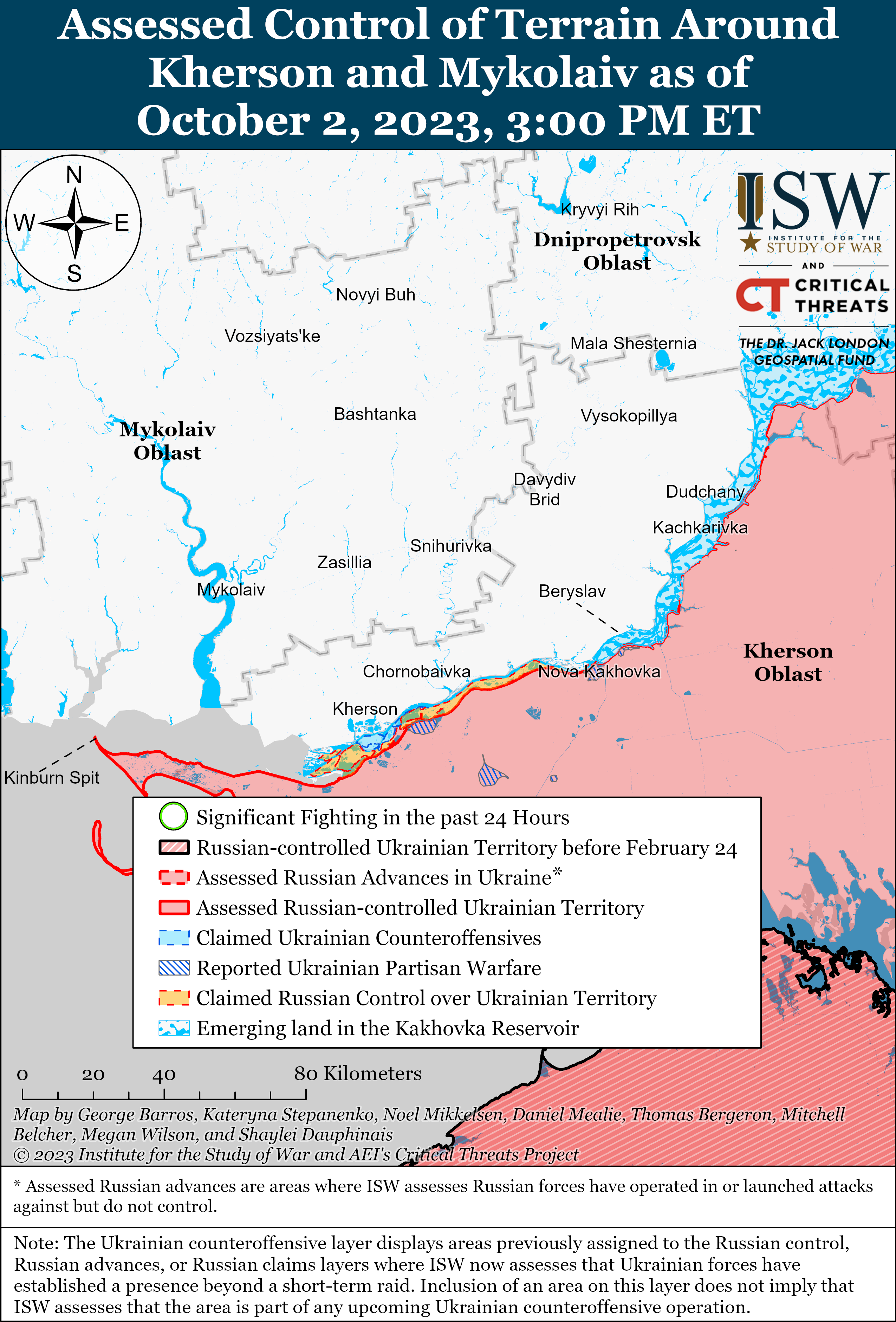
No comments:
Post a Comment